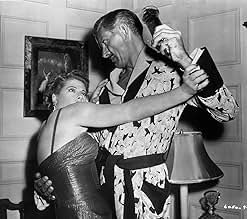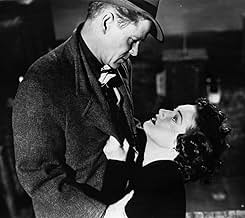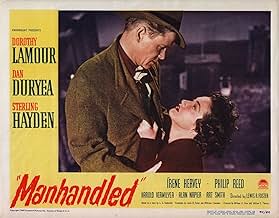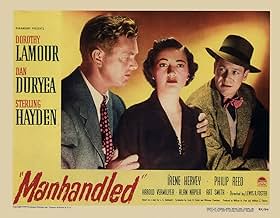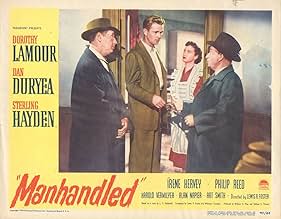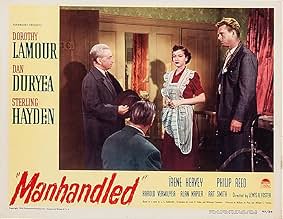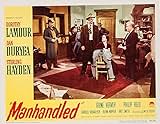VALUTAZIONE IMDb
6,5/10
994
LA TUA VALUTAZIONE
Aggiungi una trama nella tua linguaThe secretary to a psychiatrist finds herself caught up in the murder of a patient's wife and realizes that her life is also in danger.The secretary to a psychiatrist finds herself caught up in the murder of a patient's wife and realizes that her life is also in danger.The secretary to a psychiatrist finds herself caught up in the murder of a patient's wife and realizes that her life is also in danger.
- Regia
- Sceneggiatura
- Star
Benny Baker
- Boyd, Man in Apartment House Lobby with Girl
- (non citato nei titoli originali)
Stanley Blystone
- Cop
- (non citato nei titoli originali)
Paul E. Burns
- Pawn Shop Owner
- (non citato nei titoli originali)
James Edwards
- Henry, Bennet's Butler
- (non citato nei titoli originali)
Morgan Farley
- Doc, Police Lab Man
- (non citato nei titoli originali)
John George
- Newspaper Vendor
- (non citato nei titoli originali)
George Humbert
- Italian Restaurant Owner
- (non citato nei titoli originali)
Ray Hyke
- Detective Phil Wilson
- (non citato nei titoli originali)
Donald Kerr
- Reporter
- (non citato nei titoli originali)
Recensioni in evidenza
One thing about Manhandled there are no shortage of suspects for the murder of Irene Hervey. About three quarters of the way through the murderer is revealed. It's what happens after that which gives Manhandled a rather unusual twist.
What's really odd about the film is that other than being a leading man and someone for Dorothy Lamour to take an interest in, Sterling Hayden has very little to do with the solving of the case. Hayden plays an insurance investigator whose company sends him in to help the police solve the case and recover the stolen jewels. But usually in these films it's the private investigators who show up the slow witted cops. That's not what happens here, lead detective Art Smith is very much on the job, more so than the audience is lead to believe all through the film.
I'm thinking that Paramount and Sterling Hayden were about to come to an unfriendly parting and Paramount did not want to exhibit Hayden in any kind of good light. He did two films before his war service and this was the third of three afterwards. Still Hayden did do well with what little to do he was given.
Manhandled is made by the host of character actors in the film playing some interesting parts. There's Alan Napier, Hervery's husband who has been having recurring dreams about killing his wife. There's Harold Vermilyea the psychiatrist Napier was seeing about said dreams and who Dorothy Lamour works for. There's Dan Duryea who is a private detective who's been seeing Lamour. Finally there's Philip Reed who Hervey's been seeing on the side.
So when Hervey is murdered the suspects are a plenty. I will say this that the actual culprit is someone who thinks fast on their feet. But it turns out the cops have not been as dumb as the culprit suspects.
Paramount as a studio did not do much in the way of noir. But when they did do it, the results were pretty good like Manhandled.
What's really odd about the film is that other than being a leading man and someone for Dorothy Lamour to take an interest in, Sterling Hayden has very little to do with the solving of the case. Hayden plays an insurance investigator whose company sends him in to help the police solve the case and recover the stolen jewels. But usually in these films it's the private investigators who show up the slow witted cops. That's not what happens here, lead detective Art Smith is very much on the job, more so than the audience is lead to believe all through the film.
I'm thinking that Paramount and Sterling Hayden were about to come to an unfriendly parting and Paramount did not want to exhibit Hayden in any kind of good light. He did two films before his war service and this was the third of three afterwards. Still Hayden did do well with what little to do he was given.
Manhandled is made by the host of character actors in the film playing some interesting parts. There's Alan Napier, Hervery's husband who has been having recurring dreams about killing his wife. There's Harold Vermilyea the psychiatrist Napier was seeing about said dreams and who Dorothy Lamour works for. There's Dan Duryea who is a private detective who's been seeing Lamour. Finally there's Philip Reed who Hervey's been seeing on the side.
So when Hervey is murdered the suspects are a plenty. I will say this that the actual culprit is someone who thinks fast on their feet. But it turns out the cops have not been as dumb as the culprit suspects.
Paramount as a studio did not do much in the way of noir. But when they did do it, the results were pretty good like Manhandled.
"Manhandled" is a decent 1949 film with a terrific cast that could have been really excellent. Unfortunately, it suffers from a lack of focus from director Lewis Foster.
Dorothy Lamour plays the secretary to a psychiatrist (Harold Vermilyea) who is treating an author (Alan Napier). The man has a recurring dream that he kills his wife (Irene Hervey) with a large perfume bottle. The doctor thinks he needs money and might be after his wife's jewels, worth somewhere in the range of $100,000.
Lamour, whose character's name is Merl Kramer, tells a detective in her apartment building (Dan Duryea) about the strange case. Any of us who have ever seen Dan Duryea in a film know that this is a mistake on her part.
As could have been predicted, the wife of the author winds up dead, the jewels stolen, and one of the pieces winds up in Merl's couch. She pawns it and finds herself in deep trouble.
As you might be able to tell from the above description, the director isn't the only problem here. The script doesn't hold up to the most casual of scrutiny.
Granted Merl doesn't tell the Duryea character the name of her boss' client, but she certainly would know what goes on in the office is confidential. The big perfume bottle as the murder weapon is pretty lame.
The worst aspect for me is the diagnosis of the psychiatrist. A man and his wife are living under the same roof, but they're estranged. She's seeing somebody else, in fact, and the psychiatrist comes to the conclusion that the author wants his wife's jewels. That's some stretch.
It's always sad to see what happened to some of the glamorous female film stars - Lamour here is all of 34 and relegated to smaller films. Her character has a mysterious past which we never really learn about, another script hole.
Sterling Hayden plays an insurance investigator and does a good job. Art Smith is the police detective and very funny.
Kind of a mish-mash, and a convoluted plot that could have emerged as a neat twist in other hands, but some good scenes nonetheless.
Dorothy Lamour plays the secretary to a psychiatrist (Harold Vermilyea) who is treating an author (Alan Napier). The man has a recurring dream that he kills his wife (Irene Hervey) with a large perfume bottle. The doctor thinks he needs money and might be after his wife's jewels, worth somewhere in the range of $100,000.
Lamour, whose character's name is Merl Kramer, tells a detective in her apartment building (Dan Duryea) about the strange case. Any of us who have ever seen Dan Duryea in a film know that this is a mistake on her part.
As could have been predicted, the wife of the author winds up dead, the jewels stolen, and one of the pieces winds up in Merl's couch. She pawns it and finds herself in deep trouble.
As you might be able to tell from the above description, the director isn't the only problem here. The script doesn't hold up to the most casual of scrutiny.
Granted Merl doesn't tell the Duryea character the name of her boss' client, but she certainly would know what goes on in the office is confidential. The big perfume bottle as the murder weapon is pretty lame.
The worst aspect for me is the diagnosis of the psychiatrist. A man and his wife are living under the same roof, but they're estranged. She's seeing somebody else, in fact, and the psychiatrist comes to the conclusion that the author wants his wife's jewels. That's some stretch.
It's always sad to see what happened to some of the glamorous female film stars - Lamour here is all of 34 and relegated to smaller films. Her character has a mysterious past which we never really learn about, another script hole.
Sterling Hayden plays an insurance investigator and does a good job. Art Smith is the police detective and very funny.
Kind of a mish-mash, and a convoluted plot that could have emerged as a neat twist in other hands, but some good scenes nonetheless.
A stuffy novelist (Alan Napier) suffers recurring nightmares that he bludgeons his rich jewel-horse of a wife (Irene Hervey) to death with a `quart' bottle of cologne. That's bad enough, but what's worse is that he confides his dreams to a shrink (Harold Vermilyea). Didn't he know that it was the 1940s, when psychiatry was little more than a hotbed of scheming quacks? So when his wife inevitably winds up dead (and her diamonds stolen), he becomes the prime suspect, even though she had been out clubbing with another man (Philip Reed).
That's the uptown side of Manhandled; there's a seedier angle as well. The psychiatrist's transcriptionist (Dorothy Lamour) not only sits in on his sessions but later climbs the stairs to her Manhattan walk-up and spills the beans to her neighbor Dan Duryea, an ex-cop now doing repo jobs and divorce frame-ups. So much for codes of confidentiality. But when a signet ring she found while vacuuming her sofa and then pawned brings the police to her door, along with insurance investigator Sterling Hayden, it starts to look bad. It doesn't help that she just blew in from Los Angeles with forged letters of reference....
Manhandled unfurls an elaborate, and none too plausible, mystery plot competently enough, even with a few skillful touches (in its final quarter, it takes a sharp turn toward noir, and better late than never). Director Lewis Foster, however, failed to optimize the solid cast he was handed: Hayden's part never comes into clear focus and Lamour plays little more than a bland patsy. Duryea dominates, with his familiar two-faced persona as the cheery suck-up who likes to slap women around; Art Smith, as the comic relief of the police detective, becomes, after Duryea, the movie's most memorable character. It's not a bad movie, despite a couple of clunky flashbacks. But in better hands, it could have become one of the better noirs. As it stands, it merits that dark and honorable designation only by the skin of its teeth.
That's the uptown side of Manhandled; there's a seedier angle as well. The psychiatrist's transcriptionist (Dorothy Lamour) not only sits in on his sessions but later climbs the stairs to her Manhattan walk-up and spills the beans to her neighbor Dan Duryea, an ex-cop now doing repo jobs and divorce frame-ups. So much for codes of confidentiality. But when a signet ring she found while vacuuming her sofa and then pawned brings the police to her door, along with insurance investigator Sterling Hayden, it starts to look bad. It doesn't help that she just blew in from Los Angeles with forged letters of reference....
Manhandled unfurls an elaborate, and none too plausible, mystery plot competently enough, even with a few skillful touches (in its final quarter, it takes a sharp turn toward noir, and better late than never). Director Lewis Foster, however, failed to optimize the solid cast he was handed: Hayden's part never comes into clear focus and Lamour plays little more than a bland patsy. Duryea dominates, with his familiar two-faced persona as the cheery suck-up who likes to slap women around; Art Smith, as the comic relief of the police detective, becomes, after Duryea, the movie's most memorable character. It's not a bad movie, despite a couple of clunky flashbacks. But in better hands, it could have become one of the better noirs. As it stands, it merits that dark and honorable designation only by the skin of its teeth.
Manhandled is directed by Lewis R. Foster and adapted to screenplay by Foster and Whitman Chambers from the novel "The Man Who Stole A Dream" written by L. S. Goldsmith. It stars Dorothy Lamour, Dan Duryea, Sterling Hayden, Irene Hervey and Art Smith. Music is by Darrell Calker and cinematography by Ernest Laszlo.
I'm going to kill you, Ruth. I have to.
Manhandled is one of those late 40s crime mysteries that feature film noir legends and film noir narrative tints, thus why it finds itself under the film noir banner. This is more a curse than a blessing. For it's not a particularly great film, where the presence of Hayden and Duryea - and Laszlo on photography - just about keeps things bubbling away to make it watchable till the end. It has been said that the narrative is too tricksy for its own good, yet that isn't apparent since the story is very easy to follow. The twists come and go at regular intervals, but always with narrative clarity.
The main thrust of the plot finds Lamour being set up as the killer of Mrs. Alton Bennet (Hervey), with Bennet's jewels the reason for the crime. But there are a few other candidates in the frame, all of which are written to be believable suspects. The cops investigating are waspish of tongue, with Smith as dry as the Sahara, and Hayden is playing an insurance investigator who is along for the ride doing exactly the same job that the coppers are doing!
Duryea is the star attraction, playing a homme fatale type who chews gum a lot, calls his girlfriend Kitten and clearly is as untrustworthy as it gets (classic Duryea portrayal really!). Hayden doesn't show up until half an hour in, but he's a welcome arrival even if he isn't given much to get his teeth into. While Lamour pouts and ponders whilst gaining sympathy, which ultimately makes us wish she had of done more film noir type films.
There's some nice metaphorical touches, such as Duryea encamped in his apartment watching a vermin species consistently running on its wheel, and Laszlo's photography goes up a notch in the latter half of film - Lamour's apartment becomes foreboding and all the hall staircase sequences take on a greater oppressive meaning. A dream sequence is chilling, and there's one particular violent scene that is unforgettable. Unfortunately some of the comedy, whilst funny at times (drugs scenes are chucklesome), takes the pic out of its dramatic comfort zone.
Hayden and Duryea fans are safe in the knowledge that this is one to see, but it still winds up as a wasted opportunity to be something far more tougher and poignant. 6/10
I'm going to kill you, Ruth. I have to.
Manhandled is one of those late 40s crime mysteries that feature film noir legends and film noir narrative tints, thus why it finds itself under the film noir banner. This is more a curse than a blessing. For it's not a particularly great film, where the presence of Hayden and Duryea - and Laszlo on photography - just about keeps things bubbling away to make it watchable till the end. It has been said that the narrative is too tricksy for its own good, yet that isn't apparent since the story is very easy to follow. The twists come and go at regular intervals, but always with narrative clarity.
The main thrust of the plot finds Lamour being set up as the killer of Mrs. Alton Bennet (Hervey), with Bennet's jewels the reason for the crime. But there are a few other candidates in the frame, all of which are written to be believable suspects. The cops investigating are waspish of tongue, with Smith as dry as the Sahara, and Hayden is playing an insurance investigator who is along for the ride doing exactly the same job that the coppers are doing!
Duryea is the star attraction, playing a homme fatale type who chews gum a lot, calls his girlfriend Kitten and clearly is as untrustworthy as it gets (classic Duryea portrayal really!). Hayden doesn't show up until half an hour in, but he's a welcome arrival even if he isn't given much to get his teeth into. While Lamour pouts and ponders whilst gaining sympathy, which ultimately makes us wish she had of done more film noir type films.
There's some nice metaphorical touches, such as Duryea encamped in his apartment watching a vermin species consistently running on its wheel, and Laszlo's photography goes up a notch in the latter half of film - Lamour's apartment becomes foreboding and all the hall staircase sequences take on a greater oppressive meaning. A dream sequence is chilling, and there's one particular violent scene that is unforgettable. Unfortunately some of the comedy, whilst funny at times (drugs scenes are chucklesome), takes the pic out of its dramatic comfort zone.
Hayden and Duryea fans are safe in the knowledge that this is one to see, but it still winds up as a wasted opportunity to be something far more tougher and poignant. 6/10
Really loved the idea for the story, and 'Manhandled' is exactly my kind of film as a fan of crime, mystery and thriller in all media. Sterling Hayden was always watchable when he was in good roles. Likewise with Dorothy Lamour. It was interesting too seeing a pre-Alfred (from 'Batman') Alan Napier. Other than the story and my love for the genres, my main reason for seeing 'Manhandled' was for Dan Duryea in a role he could play at the back of his hand with no problem.
'Manhandled', after watching it, is worth a look. If you love Duryea and in the type of role he plays here, you won't be disappointed. If one wants a story that consistently grabs the attention and is consistently easy to follow, dependent on personal tastes 'Manhandled' may underwhelm, like it did with me. Is it a bad film? Of course not. There is plenty going for it and it is above average. It just had a lot of potential to be great.
Beginning with the good things, 'Manhandled' is shot and designed with a gritty and classy atmosphere that never lets up. It's a very good looking film without looking too clean or unneccessarily lavish. The music is suitably ominous when used. The script is generally tight and intriguing.
There is some nice tension in the storytelling, especially towards the end when things do become exciting, and did like that the atmosphere was uncompromising and had a seediness about it at times. Napier is a delight in his role and Art Smith is amusing in his. Hayden does quite well and in command with what he is given to work with and his character is not very well fleshed out. Stealing the film is a genuinely sinister Duryea, his face alone unsettles you.
Lamour is a lot less good however in my view. Her role is practically a nothing cipher and Lamour is very bland in it. The direction is competent enough if undistinguished and could have generated a lot more tension and crispness, some of the middle felt on the pedestrian side.
Although the story has moments, it tended to be too convoluted as a result of too much going on and too many characters. The flashbacks do intrigue in parts but generally slow the pace down and further confuses the story rather than making it clearer.
Concluding, above average but not much more. 6/10
'Manhandled', after watching it, is worth a look. If you love Duryea and in the type of role he plays here, you won't be disappointed. If one wants a story that consistently grabs the attention and is consistently easy to follow, dependent on personal tastes 'Manhandled' may underwhelm, like it did with me. Is it a bad film? Of course not. There is plenty going for it and it is above average. It just had a lot of potential to be great.
Beginning with the good things, 'Manhandled' is shot and designed with a gritty and classy atmosphere that never lets up. It's a very good looking film without looking too clean or unneccessarily lavish. The music is suitably ominous when used. The script is generally tight and intriguing.
There is some nice tension in the storytelling, especially towards the end when things do become exciting, and did like that the atmosphere was uncompromising and had a seediness about it at times. Napier is a delight in his role and Art Smith is amusing in his. Hayden does quite well and in command with what he is given to work with and his character is not very well fleshed out. Stealing the film is a genuinely sinister Duryea, his face alone unsettles you.
Lamour is a lot less good however in my view. Her role is practically a nothing cipher and Lamour is very bland in it. The direction is competent enough if undistinguished and could have generated a lot more tension and crispness, some of the middle felt on the pedestrian side.
Although the story has moments, it tended to be too convoluted as a result of too much going on and too many characters. The flashbacks do intrigue in parts but generally slow the pace down and further confuses the story rather than making it clearer.
Concluding, above average but not much more. 6/10
Lo sapevi?
- QuizStar Dorothy Lamour, in her autobiography, described working with George Reeves in the role of "an extremely sinister cad," despite the fact that he is nowhere to be seen in the film and no studio or trade references confirm his participation.
- BlooperThe police would never have allowed a private detective to search a suspect's room unaccompanied because of the risk of evidence being planted, which is exactly what happened. Similarly they would not have tolerated interference by an insurance investigator.
- Citazioni
Detective Lt. Bill Dawson: I've never known a congenital wise-guy yet that didn't outsmart himself.
- ConnessioniReferenced in Mai dire sì: Cast in Steele (1984)
I più visti
Accedi per valutare e creare un elenco di titoli salvati per ottenere consigli personalizzati
- How long is Manhandled?Powered by Alexa
Dettagli
- Data di uscita
- Paese di origine
- Lingua
- Celebre anche come
- Manhandled
- Luoghi delle riprese
- Azienda produttrice
- Vedi altri crediti dell’azienda su IMDbPro
- Tempo di esecuzione
- 1h 37min(97 min)
- Colore
- Proporzioni
- 1.37 : 1
Contribuisci a questa pagina
Suggerisci una modifica o aggiungi i contenuti mancanti

